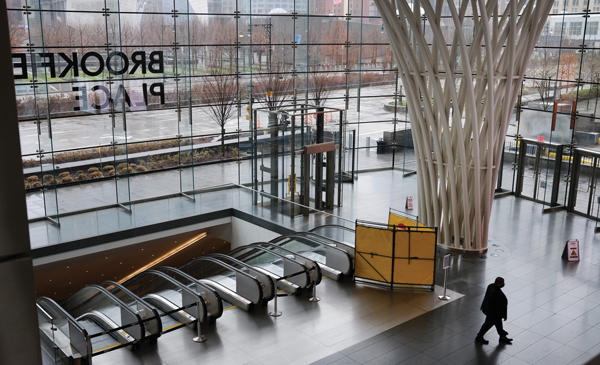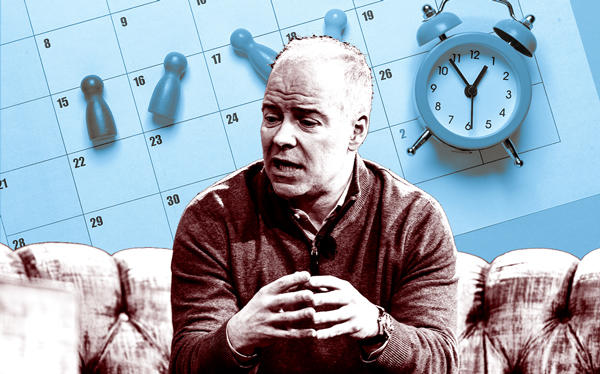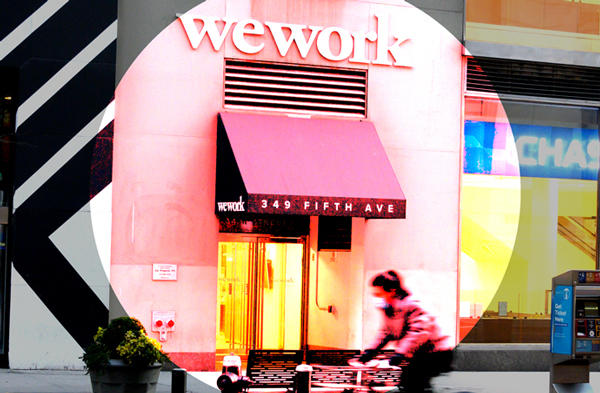No one is immune to the coronavirus, nor is any company immune to the economic crisis the pandemic is inflicting.
And just as some people exposed to the virus barely get a fever, but others end up on a ventilator, some companies are taking a worse hit than others.
There are thousands of firms reeling from the dislocation of seeing their customers disappear and their workers forced to stay home. And the effect can be measured on scales large and small.
The Dow dropped more than 9,000 points during the first weeks of March (before recovering about a third of that by the end of the month).
And within two weeks of the city offering interest-free loans of up to $75,000 to businesses with fewer than 100 employees that were harmed by the pandemic, more than 10,000 business owners had filed pre-applications for the relief.
So these five examples are by no means the full picture of economic suffering now felt by firms of all sizes. But they offer some vivid snapshots of how different types of firms are being affected — and how they are responding.
Read more
Airbnb deflates
Home-sharing startup Airbnb has lost tens of millions of dollars in booking revenues over the past several weeks in key cities hit hard by the coronavirus outbreak.
The company’s booking revenues fell dramatically across 17 key international cities over a span of five weeks starting at the beginning of February, according to analysis by The Real Deal of data from the Airbnb-analytics firm AirDNA.
Since the start of February, when the virus first began spreading outside China, Airbnb’s booking revenues declined by about 20 percent, dropping by $17.6 million.
But that absolute drop comes in the context of an expected growth of roughly $30 million if booking revenues had continued growing at the pace of nearly 35 percent the firm saw in those markets over the same period last year. That amounts to a swing of nearly $48 million.
Meanwhile, the company angered its hosts with a surprise decision on March 14 to expand its “extenuating circumstances policy” globally in response to the pandemic. The change means guests with bookings made before that date can now cancel their accommodations and claim deposits held for hosts, without incurring a penalty.
Airbnb superhost Joy Rose, who owns properties in New York and Florida, said she was “shocked” by the decision and how it was communicated.
“We are the worker bees of Airbnb,” she said. “We’re the ones doing the labor; we’re the ones cleaning our houses and making them great. So to not consult us, and to unilaterally make this decision, is extremely harmful.”
In an open letter to hosts published March 17, the company acknowledged the decision “has caused incredible hardship for many of you.”
That same day, Airbnb’s policy and communications chief, Chris Lehane, sent a letter to House Speaker Nancy Pelosi and Minority Leader Kevin McCarthy to consider several tax breaks for Airbnb hosts.
Desperate to trim costs, the company has also suspended all marketing, and top executives will take a 50 percent pay cut, according to Reuters.
The timing of the pandemic could not have been worse for the company, which was preparing for a highly anticipated public offering this year.
While there have been reports that the IPO will now be pushed back, a spokesperson for the company declined to comment on the timeline, referring TRD to a brief statement issued last year announcing the company’s intent to go public in 2020.

Brookfield Place in Battery Park City
Brookfield of battle
The biggest commercial landlord in New York City, Brookfield Property Partners, isn’t used to volatility in its share price. Its stock has traded within a relatively narrow band of around $20 per share for the past several years.
But when the coronavirus contagion infected the stock market in late February, the Canadian colossus began an unprecedented slide, ending March at $8 a share.
Brookfield owns hotels, a sector devastated by the collapse of travel. And it acquired mall owner General Growth Properties in 2018, giving it significant exposure to retail, another sector laid low by the virus, with most malls and retailers closing their doors either voluntarily or by government order.
But the $3.6 billion firm is well diversified across office, residential and industrial properties. Brookfield holds 26 million square feet of office space across 25 properties in New York City alone.
In a March 20 update for shareholders, Brookfield warned that the coronavirus crisis would deal a major blow to its retail portfolio, but pointed out that its core office portfolio is 93 percent leased and provided nearly 70 percent of the company’s net income in 2019.
The firm also has $6 billion of capacity in undrawn credit lines and cash on hand, making it rather well positioned to ride out a short-term crisis.
But the reassurances apparently failed to inspire shareholders. Right after the reassuring missive went out, Brookfield’s share price actually dropped; it finally ended the month a bit lower than before the letter.

Realogy CEO Ryan Schneider
Realogy’s reality check
Coronavirus impacts have hit Realogy — but not in the form of reported infections or layoffs.
The brokerage giant is temporarily cutting salaries and workweeks for a “majority of our employees,” the company disclosed in a regulatory filing last month. Realogy said its CEO, Ryan Schneider, who earns a base salary of $1 million, will take a 90 percent pay cut and his direct reports agreed to a 50 percent pay cut, effective April 4.
The parent company of the Corcoran Group, Coldwell Banker and Sotheby’s International Realty will also pull back on marketing expenses and delay investments in certain strategic initiatives as it grapples with the economic fallout of the fast-spreading pandemic.
“As it has become clearer the impact coronavirus could have on our industry and our business, we have also made proactive and informed moves,” Realogy said in a statement. The cuts are “intended to increase liquidity to support its operations,” according to the company.
The holding company said it is working with federal, state and local governments on relief measures, including the $2 trillion stimulus deal. In particular, Realogy had advocated that independent contractors and small businesses be included in relief bills. “We want transaction closings to be considered equivalent to banking activities when determining essential services,” the company said.
To supplement its cash on hand, Realogy said, it borrowed another $400 million from its lenders. As of March 23, it had $487 million cash on hand. The company waived certain fees for franchisees, including monthly minimums and fees for transactions during the second quarter.
Realogy, which has seen its stock hover at around $3 a share in the last week of March, also suspended its instant home-buying program, known as RealSure, last month (see related story on page 52).
“With the volatility of the current market, we do not believe that RealSure can now provide the value the program was designed to deliver,” the company said in a statement.

A WeWork location
Won’tWork
WeWork won’t be hitting its targets this year, and its executives are blaming the coronavirus.
CEO Sandeep Mathrani and Executive Chairman Marcelo Claure buried the news in a long footnote to a March 26 letter to bondholders, Bloomberg reported.
The letter also listed a number of measures WeWork is taking to confront the pandemic, including “enhanced cleanings and suspended events across our locations” and an “enhanced work-from-home policy.”
Meanwhile, WeWork has drawn criticism for its enhanced show-up-for-work policy — offering its workers a bonus of $100 a day to brave the pandemic and staff the firm’s many still-open locations, the New York Times reported.
WeWork’s customers are blasting the firm for keeping most of its buildings open during the coronavirus outbreak, while many other co-working firms have shuttered under government stay-at-home orders that went into effect March 23.
The co-working giant, which has reported several coronavirus cases at its locations, told its tenants that it has stayed open because some of them operate essential businesses — and thus WeWork was essential and could remain open … and continue charging membership fees.
One good reason for keeping the money coming in was that SoftBank, WeWork’s majority owner, threatened in mid-March to back out of its $3 billion plan to buy shares back from employees and investors.
The tender offer stood to primarily benefit just five investors, as $2.1 billion in proceeds from the purchases would go to them, according to Bloomberg. WeWork co-founder and former CEO Adam Neumann could reap up to $970 million in the deal.
SoftBank was scheduled to close on its stock buyback April 1, but the firm has said it is not obligated to go through with it, citing ongoing government investigations into WeWork.
Mayhem at Marriott
The world’s largest hotel company took the industry’s most dramatic action in response to the global pandemic.
Marriott announced sweeping layoffs on March 17 as it moved to close hundreds of locations around the world, the Wall Street Journal reported, putting tens of thousands of hotel staff out of work.
The firm’s cost-cutting was so swift and dramatic that CEO Arne Sorenson warned analysts and investors on a March 19 conference call it may hurt the hotel chain when the time comes to ramp back up.
“I am worried we are cutting so deeply that the rebuilding process will be more challenging than we anticipated,” he said, “and maybe, to some extent, that we might regret having moved as aggressively as we’ve moved.”
But Marriott announced days later that it also plans to furlough two-thirds of its corporate staff — at its Maryland headquarters and overseas, the Wall Street Journal reported, with furloughed workers receiving 20 percent of their pay and remaining staff taking a 20 percent pay cut.
Marriott is putting in place a range of cost-cutting measures, such as suspending brand-standard audits in order to reduce expenses for property owners and delaying some renovations.
Nonetheless, Marriott announced on March 18 — the day after it joined other hospitality giants in appealing for a $150 billion taxpayer bailout for the hotel industry — that its first-quarter dividend of nearly $156 million, payable on March 31, would proceed as scheduled.
The company also said at the time that it would suspend share buybacks, but it might have passed on a bargain. That same day, Marriott stock had cratered to less than $64 — a nearly 55 percent drop from before the sell-off began.
